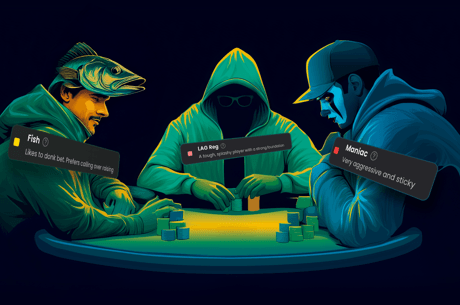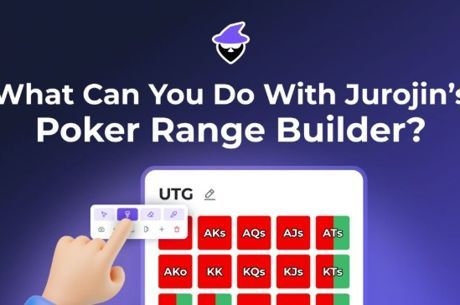10 Steps for Controlling Your Own Tells

Many of us are good at noticing patterns of behavior and the playing styles in others. We readily identify our opponents as LAGs, TAGs, "ABC" players, fish, rookies, clueless, maniacs and rocks. We notice that the guy in the three seat gets loose as hell when he's down to a short stack, and that the woman in the one seat becomes chatty when she holds a monster.
We recognize what others are doing, including their tells, and try to exploit them. But how good are we at identifying our own tells, patterns of behavior and playing styles? In other words, how are we doing minimizing the information we give away and which can be used to exploit us?
Most of us aren't terribly good at that.
Internal observation, self-awareness and the ability to change your behavior based on those observations is a key to better play, especially as you face tougher opponents. It's good to have 20/20 vision when we view our opponents, but we have enormous leak if we aren't seeing ourselves and what we're doing so clearly.
What follows is a list of 10 questions you can ask yourself at the tables in order to help start you down the tough road of self-awareness and self-control. They start with questions about basic physical awareness and proceed to address more "interior" observations. Once you are more aware of yourself, you can then go on to modify your behavior accordingly — to make yourself less exploitable.
1. How do you tend to sit at the table?
Recognizing your habits of play starts with recognizing your physical habits at the poker table. The most central of these is how you sit. Are you leaning back in your chair? Are you sitting forward and leaning on your arms on the table? Are you pitched to one side? Are your feet squarely on the floor, aside your chair, or sticking forward under the table?
I'm not suggesting that one position is necessarily any better than any other (though, over time, some positions may cause you shoulder, neck, back or leg pain). But initially, you need to recognize what you are doing with your body when you play. This process of noticing is a large step toward controlling your behavior.
2. Do you find yourself altering your physical position from time to time?
Let's say you have noticed that most of the time you tend to sit back in your chair with your legs stretched forward and your arms crossed over your chest. Call this your "default table posture." But you've also noticed that sometimes you sit forward, with your elbows resting on the rail, head up, knees bent and feet on either side of your chair. Notice what you usually do and make note of when you change to do something different.
3. Why does your posture change?
Once you are aware of your default posture and then also how you sometimes alter that default posture (if you do), can you draw a connection between those changes and the hand you are in?
For example, a student I was coaching normally sat back relaxed in his chair. I noticed that he sat up and became physically more alert and engaged when he held a strong hand. Though his betting action may not have betrayed the true strength of his hand, his posture absolutely did! Can you make any connections between your relative hand strength and the way you sit at the table?
4. How do you behave at the table? What is your general affect?
This is a tough question because we all do many different things. Start by making a list of the things that you do, or don't do, and what your general demeanor is at the table.
Do you sit quietly for long periods, just observing? Do you play games on your phone? Do you sing, whistle or hum to yourself? Do you drink, chew gum or read? Do you tend to have small talk with the people sitting next to you? Do you listen to music, psychologically removing yourself from the other players. Do you talk to other players around the table about how they played hands? Do you get into arguments with other players about how they play their hand?

Make a list of all of the things that you do, then try and identify what you do most frequently, commonly, occasionally or only rarely.
5. Do certain stimuli cause you to do anything that you don't typically do at the table?
This can be a hard one to answer, although it's crucial to understanding your own tells and reactions. Much as you did when you thought of how your physical posture might change based on your attitude toward your hand, how might your behavior change based on your hand situation?
For example, do you find that you become more belligerent when you are confident in the strength of your hand? Or perhaps, conversely, you become more docile and agreeable? Do you become talkative when you have a sure winner? Or do you clam up? Are you silent when you are bluffing? If you've suffered a bad beat, did you tend to retreat into silence and disengagement, or do you lash out at other players and argue about how they played their hand? Are you defensive when your long shot comes in? Apologetic and humble? Or do you feel you have to justify why you played your hand the way you did, arguing that you deserved your unlikely win?
I'm not suggesting that any of these behaviors are right or wrong. I'm just asking that you pay attention to your behavior and note what you do differently in different situations. For simplicity's sake, don't start with all of the things that you do at the table, and all of the stimuli. Start by noticing one behavior, and see if you can connect it to one stimulus.
6. What is your image in the minds of the other players?
If someone you didn't know were silently observing you for a while, how would that person describe your playing style? Maybe you think of yourself as a happy, confident, easy-going, tight-aggressive player. But how would the other players — the thinking players, at least — tend to describe you based on what they've seen of you in this most recent playing session?
Resist the urge to answer "How should I know?" and really try to see yourself through the eyes of your opponents.
7. What do you want to be doing at the table?
If you were designing the ideal poker player, how would that player behave in different situations? Would this ideal player crow after winning a hand? Would that player justify a victory after sucking out on the river? Would that player sit quietly for hours, not reacting at all — or always acting the same way — when winning or losing?
Think about how you'd answer that question for a while before moving on to the next one.

8. Specifically, applying this ideal player to yourself, what would you need to change in your behavior to behave more like your imagined ideal player?
Would you become more consistent in your behavior, regardless of your hand situation? Would you scale back your negative reactions to bad beats? Would you tone down the displays of victory when you won a hand? Would you talk less and listen more?
If your answer is "I wouldn't change a thing," then you are either not sufficiently self-aware, not applying high enough standards to yourself or not thinking hard enough.
9. Recognizing the above, what "triggers" prevent you from behaving as you would ideally like to behave? Put another way, what stimuli cause you to behave in a way other than how you would ideally like to behave?
What are some examples of such "triggers"? A player who is generally quiet and restrained, preferring to listen to music and keep to himself, becomes garrulous and verbal with his defeated opponent when he wins a large pot. Another gets irritated and anxious whenever he faces a raise preflop. Another gets looser and bolder than his typically restrained self when he is up even a small amount.
Again, I'm not judging any of these behaviors. I'm just asking that you observe what triggers make you deviate from what you consider to be your ideal behavior.
10. What are the physical manifestations of your reactions to these triggers?
Perhaps when you are anxious about the strength of your hand — the flop missed you after you three-bet preflop, for example — you find yourself sitting back in your chair and folding your arms. Or shaking your head, or smiling or looking away. Maybe when you are on a flush draw, you find yourself staring at the dealer's hands as she deals out the turn (so you'll catch sight of the card as soon as possible). Maybe when you are weak but have bet aggressively on the river as a bluff, you find yourself tensing up your jaw, or swallowing a lot, or licking your lips or making a fist.
Try to notice these moments of physical and emotional change. And then, think about what might be causing them.
Conclusion
Changes to our demeanor, behavior and affect provide our opponents a window into the true strength of our hand. But before we can neutralize them — and thereby inhibit our tells — we must first be fully aware of what we are habitually and unintentionally doing and not doing as we play.
Developing this awareness is hard, requiring first that we recognize what we are doing, then that we see ourselves through our opponents' eyes. Answering these 10 questions should start you down that necessary road to reach full self-awareness at the poker table.
Ashley Adams has been playing poker for 50 years and writing about it since 2000. He is the author of hundreds of articles and two books, Winning 7-Card Stud (Kensington 2003) and Winning No-Limit Hold'em (Lighthouse 2012). He is also the host of poker radio show House of Cards. See www.houseofcardsradio.com for broadcast times, stations, and podcasts.










